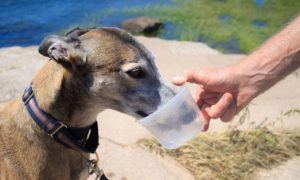“This post contains affiliate links, and I will be compensated if you make a purchase after clicking on my links.”
If your normally happy dog is not feeling well a trip to your vet may be in order. They will run tests, and one test will probably be for high levels of blood nitrogen in dogs. This is not a common problem a dog owner and his pooch will normally be faced with, so these tests are needed to run down why your dog is not feeling well.
High levels of blood nitrogen in dogs
High levels of blood nitrogen in dogs are termed Azotemia. This is a medical condition where excessive levels of creatinine, urea, and other body waste substances high in nitrogen are not being correctly eliminated from your dog’s system. This can be due to poor kidney function, feeding your dog a diet very high in protein, gastrointestinal bleeding allowing the high nitrogen substances to enter the dog’s bloodstream, and the urine being absorbed back into the bloodstream. This condition is often tied in with Uremia, a medical condition where your dog is not able to properly eliminate body waste due to poor kidney function.
The symptoms to look for if you suspect high levels of blood nitrogen in dogs are the following. Constant fatigue, the fur will be in poor condition, hypothermia, diarrhea, vomiting weakness, depression, bad breath, wasting away of muscle mass, constipation, a loss of appetite, black and blue or purple spots on your dog’s skin due to ruptured blood vessels, and small red or purple dots on the skin as a result of blood vessels right under the skin bursting.
The causes for this condition include the high protein diet, a fever, infections, burn traumas to the skin, gastrointestinal bleeding, severe kidney disease or kidney failure, corticosteroid toxicity, low blood pressure or low blood volume, and a possible urinary obstruction.
At your veterinarian’s, give a complete medical history of your dog from the time he or she was a puppy, if the vet doesn’t already have such. Also a complete rundown on when the symptoms started being noticeable, and exactly what the symptoms were. The vet will then perform a battery of tests to track down exactly what is causing the issue. The type of treatment will depend on what the tests reveal but surgery is not normally required.
Hopefully your dog’s condition can be managed by diet. A description from an eHow.com article reads:
Feed your dog a diet that is formulated for those with high creatinine and BUN levels. This is typically a high-quality, low-protein and low-phosphorus diet. Eating this type of food may decrease the stress that is put on the kidneys by other foods.
Do you have a dog or know anyone with a dog with this condition? Please share this article with fellow dog owners.


















In what ration blood nitrogen is normally found in dogs? I want to know about it.